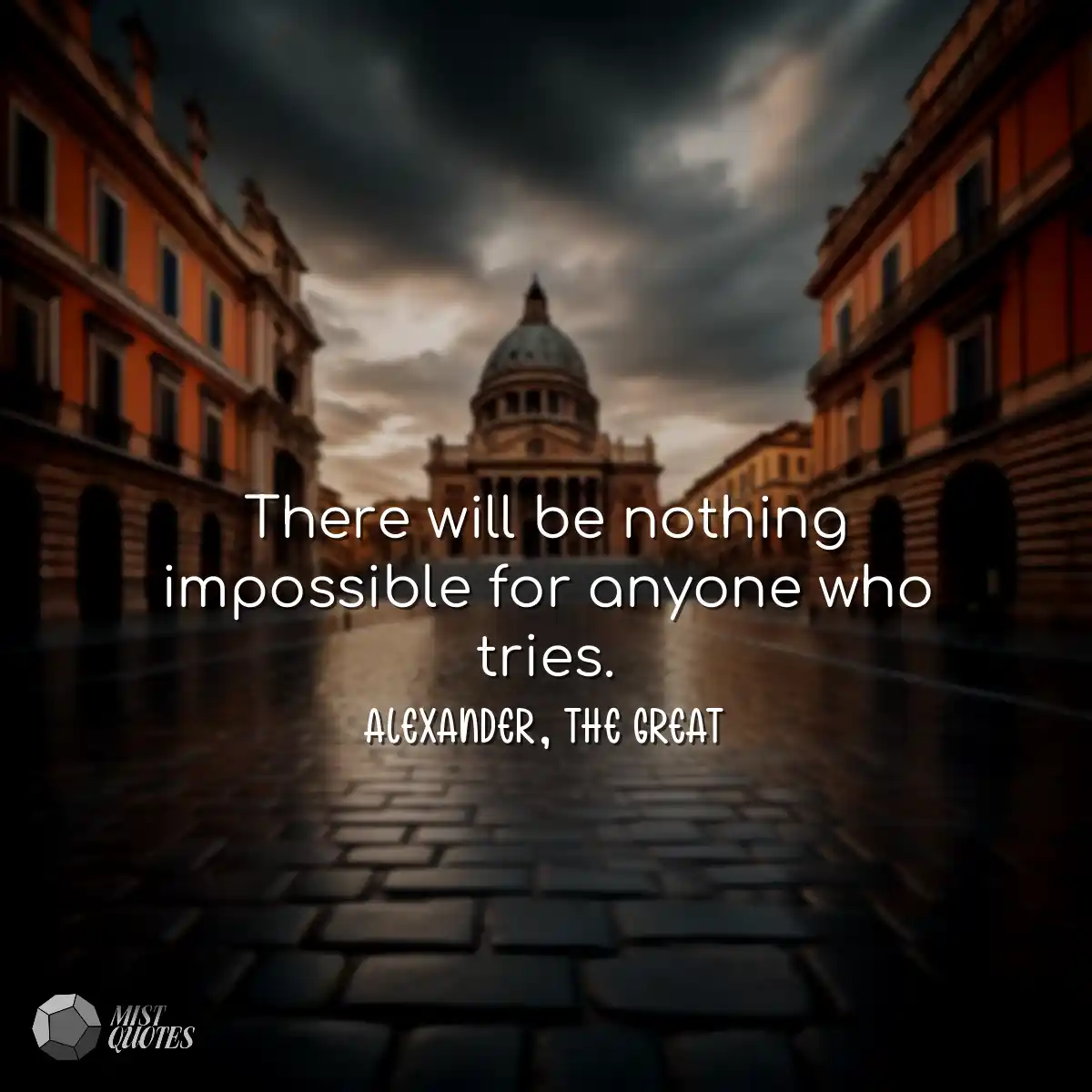
Alexander, the Great
Military leader

I am not afraid of armies of lions led by sheep; I am afraid of armies of sheep led by a lion.

Remember that when you leave this world, you cannot take with you anything you gained, only what you gave.

There will be nothing impossible for anyone who tries.

I would rather conquer a single spirit than ten thousand swords.

Destiny is not something to be pursued, but something to be achieved.

No matter how difficult it is, I won't change my plans.

I am the owner of my destiny, I do not let my hopes and fears control the course of my life.

The fear of death is a reflection of a life not fully lived.

Cut the Gordian knot.

An army of sheep led by a lion will defeat any army of lions led by a sheep.
Alexander the Great, born in 356 BC in Pella, Macedonia, is one of history's most celebrated military leaders. He ascended to power at the tender age of 20, inheriting a powerful kingdom from his father, King Philip II. However, it was Alexander's remarkable military prowess, strategic genius, and unyielding ambition that catapulted him into the annals of history as one of the greatest conquerors of all time.
One of Alexander's most renowned achievements was his conquest of the vast Persian Empire, then the most powerful empire in the world. In 334 BC, he led his army across the Hellespont into Asia Minor, marking the beginning of his audacious campaign. Despite facing daunting odds, Alexander won a series of decisive battles against the Persian forces, including the iconic battles of Issus and Gaugamela. His tactical brilliance and the unwavering loyalty of his troops enabled him to defeat Darius III, the Persian king, and ultimately seize control of the Persian Empire.
Beyond conquering the Persian Empire, Alexander's ambition knew no bounds. He continued his conquests eastward, annexing territories and establishing Greek influence across vast regions of Asia. From Egypt to India, Alexander's military campaigns reshaped the geopolitical landscape of the ancient world. His legendary march through the deserts of Egypt to the plains of India remains a testament to his indomitable spirit and vision of global conquest.
While Alexander was undoubtedly a formidable warrior, he was also a visionary leader who recognized the importance of cultural exchange and integration. Throughout his conquests, he encouraged the spread of Greek culture, language, and customs, a phenomenon known as Hellenization. By founding numerous cities, including Alexandria in Egypt, Alexander sought to promote Greek ideals of art, philosophy, and governance. His efforts not only facilitated the blending of diverse cultures but also laid the foundation for the Hellenistic Age, a period of flourishing intellectual and artistic achievement.
Alexander's untimely death in 323 BC at the age of 32 may have cut short his conquests, but his legacy endured for centuries to come. He left behind a vast empire spanning three continents, a testament to his unparalleled military genius and ambition. Moreover, Alexander's conquests fostered cultural exchange and paved the way for the spread of Greek civilization to the far reaches of the ancient world. His enduring influence can be seen in the realms of politics, art, and philosophy, shaping the course of history for generations to come.
In the annals of history, few figures loom as large as Alexander the Great. Through his audacious conquests and visionary leadership, he carved out an empire that stretched from Greece to India, leaving an indelible mark on the ancient world. His legacy as a military genius, cultural innovator, and global visionary continues to inspire awe and admiration to this day, ensuring that his name will be remembered for eternity. Alexander the Great, truly deserving of his epithet, remains an enduring symbol of human ambition and achievement.
Recent Quotes
"To help a friend in need is easy, but to give him your time is not always opportune."
Charlie Chaplin
"Life can be wonderful if you're not afraid of it. All it takes is courage, imagination… and a little dough."
Charlie Chaplin
